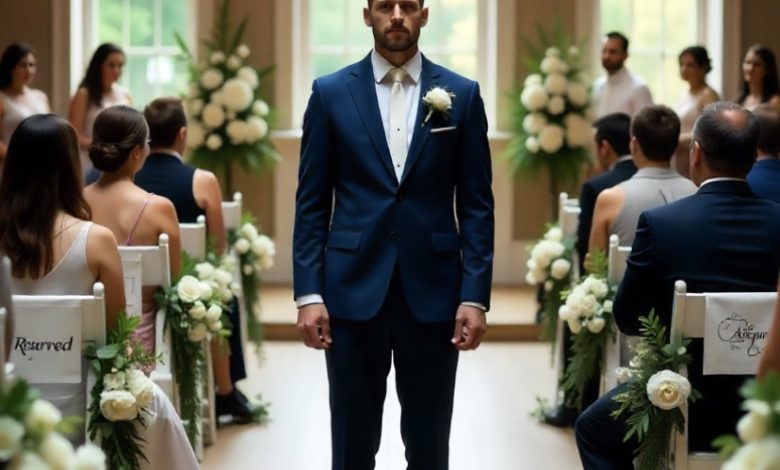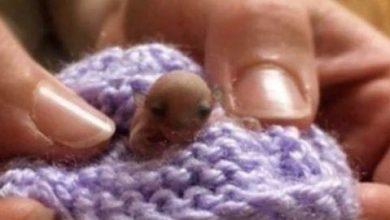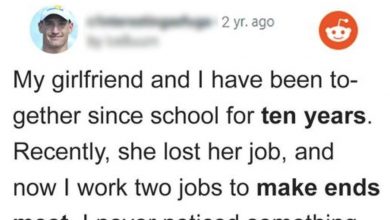At my wedding, the people I expected most weren’t there. My parents and my best friend skipped it, choosing my sister’s engagement celebration instead.

My name is Elias, and I am 29 years old. Last Saturday, I married the love of my life, Laya. People had always told me that your wedding day is supposed to be one of the happiest days of your life, a blur of love, joy, and laughter, surrounded by the people who matter most. And for a while, it was like that for me. The ceremony was beautiful, Laya looked radiant, and our friends filled the room with warmth and smiles. But in the middle of all of that happiness were five empty seats. They were the seats meant for my parents, my sister Alina, and my best friend Matt. Those seats stayed empty the entire day because none of them came.
Instead, they all went to Alina’s engagement party. My own sister had planned her celebration for the exact same day as my wedding, even though she had known my wedding date for eight months. And my family chose her.
The signs were already there before the wedding. When I sent out my invitations, the replies from my family were halfhearted. My mom sent back a short message saying, “We’ll have to see if we can make it work, dear.” My dad waited three days and then sent a thumbs-up emoji, nothing more. Meanwhile, Alina sent out gold-foiled invitations with professional photos of her and her fiancé, looking perfect on a beach. Relatives praised her announcements, shared them online, and treated them as though they were invitations to royalty.
I had always been used to being second best. Alina was the golden child, the one my parents always boasted about. But I had naively thought that my wedding would be different. I believed, foolishly, that this time they would put me first, if only for one day.
Two weeks before my wedding, I called my mom to make sure they were still planning to come. She hesitated and said, “Eli, your sister’s engagement party is the same day. It’s going to be difficult for us to attend both.”
I laughed at first, thinking she was joking, but she wasn’t. She explained that Alina’s future in-laws were flying in from Europe and that it was impossible for them to miss it. “We just can’t be in two places at once,” she said, as though that explained everything.
I hung up the phone with my hands shaking. I didn’t tell Laya right away because I didn’t want to ruin her joy. Then, the night before the wedding, Matt, the man who was supposed to be my best man, called me. “I’m really sorry, man,” he said, “but Alina’s party… it’s kind of a big deal.”
That was when I realized the truth: I would walk down the aisle without my family and without my best friend.
On the wedding day, I put on my suit and forced a smile. I told myself I wouldn’t let their absence ruin it for me or for Laya. And for a while, it worked. When Laya appeared, looking breathtaking, everything else seemed to fade. The vows, the smiles, the love in the room — it felt like it should have been enough. But every time my eyes wandered to those empty chairs, the hurt came rushing back.
During the reception, as Laya and I cut the cake, my phone lit up. A message from my mom read, “We need to talk. Now.” Then came the calls. One after another, my phone vibrated nonstop. By the end of the hour, I had 52 missed calls.
Laya leaned close and whispered, “What’s wrong?” I didn’t know what to say. My phone buzzed again, this time with a message from my cousin Amelia. She has always been the one person in the family who speaks the truth. Her message read, “You won’t believe what’s happening here. Call me, but don’t tell anyone I told you.”
I stepped outside into the cool night air and called her. She answered immediately. “Elias, they’re talking about you,” she said in a hushed voice. “They’re telling people you planned your wedding on purpose to compete with Alina. Your dad is telling her fiancé’s family that you’re not close to us anymore. And Matt — he’s telling people he couldn’t be your best man because you were difficult about the guest list.”
I couldn’t even breathe for a moment. They had not only skipped my wedding, but they were turning the story around to make me the villain. Amelia hesitated, then added, “And your mom keeps calling you because she wants you to fix a problem at Alina’s engagement party. She says it’s urgent.”
I stood there in disbelief. They had abandoned my wedding, destroyed my name, and then wanted me to fix their problems.
Later that night, after Laya and I returned to our hotel suite, I got another message from Amelia. It was a photo. Alina stood at her engagement party with a glass of champagne, smiling, and around her neck was my late grandmother’s wedding necklace.
That necklace wasn’t just jewelry. It was the only heirloom my grandmother had left me. Before she passed, she had taken my hand and said, “Eli, this is for the woman you marry.” She even wrote it in her will. Months ago, my mother told me it was damaged and unusable. And now there it was, glittering on Alina’s neck. In the background of the photo, Matt was standing next to her, laughing, holding a drink.
Almost as if it had been planned, my phone buzzed again. A voicemail from my mom. Her voice filled the room: “Elias, I don’t know why you’re not answering. We need you to call in a favor with that restaurant you know. And oh, by the way, I gave Alina grandma’s necklace so she could wear something meaningful. Don’t make this into a big deal. It’s just a piece of jewelry.”
Just a piece of jewelry.
In that moment, something inside me broke. All the years of being overlooked, all the times they chose her, all the excuses — it hardened into something sharper, colder. This time, I wasn’t going to let it slide.
The next morning, instead of feeling the joy newlyweds are supposed to feel, I felt a heavy fog of disbelief. My phone buzzed nonstop with messages dripping with guilt and demands. “You need to call your sister.” “The right thing to do is to help fix this.” My father’s voicemail told me I needed to be the bigger person.
But I didn’t cry. I didn’t rage. Instead, I started a quiet plan. I saved every screenshot, every voicemail, every photo. I opened a folder on my laptop and titled it simply, “For Later.” I found the scanned copy of my grandmother’s will and read it again. The words were right there in black and white: “I leave my wedding necklace to my grandson, Elias Harper, to be given to his bride on the day of their wedding.”
It wasn’t just cruel what my mother had done. It was legally wrong.
But I stayed silent. I didn’t confront them. If I did, they would twist it like always. “Elias is overreacting. Elias is dramatic.” I knew better than to give them that chance. So I kept calm. I posted one single wedding photo of Laya and me, smiling and happy, and ignored the storm of messages. On the outside I looked calm, but inside, something cold and steady was taking shape.
In the months that followed, I poured everything into building a life away from their chaos. At work, I rose from mid-level manager to director, landing a major client that increased revenue by nearly 40%. My salary doubled, and I began investing in real estate. Within a year, the income from my three rental properties nearly matched my job’s salary. Laya and I bought a bright, modern house on the edge of the city. We made new friends, people who respected us and cared for us. For the first time, I felt free of them.
Amelia sent me quiet updates. Alina’s wedding planning was a mess. My parents complained that I was distant. Matt acted like nothing had happened. I never responded. My silence cut off their drama.
One afternoon, a national magazine ran an article about young professionals who achieved financial independence before 35. I was one of them. Amelia told me my mom had bought three copies. I didn’t say a word. I didn’t need their approval, but I knew the truth was building behind me like a shadow they couldn’t escape.
About eighteen months later, Amelia emailed me a scanned copy of the estate inventory. At the bottom, in my mother’s handwriting, was a note: “Released to Alina Harper for temporary use, June 15th, to be returned to rightful owner.” The date was the night of the engagement party. She had signed proof that the necklace belonged to me.
At the same time, I learned from a wedding planner that Alina’s wedding would be a huge, public event at an exclusive estate. That was when I realized I had both the evidence and the perfect stage.
I hired an attorney, not to sue, but to prepare. I built connections quietly with people who would be at her wedding — journalists, business leaders, even the owner of the venue. I said nothing about being her brother. I just made sure I was in the right circles.
The final piece fell into place when Amelia whispered over the phone, “Mom is bragging that Alina will wear the necklace at her wedding. She says you don’t care about family traditions anymore.”
That was the last straw.
On the day of Alina’s wedding, my attorney hand-delivered the documents to the venue: the will, the release form, and a demand for the necklace’s return. Panic rippled through the bridal suite. Amelia’s texts kept me updated: “She’s screaming at Mom. She just threw a hairbrush at Matt. They’re taking the necklace off her right now.”
The venue’s lawyer confirmed that Alina could not wear disputed property. My mother tried to brush it off as a misunderstanding, but the signed release was undeniable.
The next morning, a lifestyle journalist I had tipped off published an article titled: “The Missing Heirloom: The Hidden Drama Behind the Harper Wedding.” It spread quickly, picked up by other outlets. My parents’ image crumbled. Alina’s in-laws were furious.
I never spoke to my parents again. Not out of anger, but because there was nothing left to say. They made their choice when they skipped my wedding. All I did was make sure the world finally saw it for what it was.
A year later, on our anniversary, Laya wore the necklace for the first time. As the sunlight caught the diamonds, I thought of my grandmother. I thought of her promise to me and the love she wanted me to have.
“Feels like it finally came home, doesn’t it?” Laya said softly, smiling.
I nodded. It wasn’t just about the necklace. It was about dignity, about truth, about finally standing up for myself. They had left me out of their lives long ago. That day, I closed the door behind them. And this time, I threw away the key.










